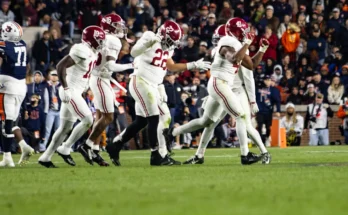**“GOLDEN GLORY IN SANTIAGO: Team USA Dominates Brazil in FIBA Women’s AmeriCup Final as Gamecocks and WNBA Stars Lead Charge to Championship”**
Team USA’s women’s basketball team once again demonstrated why it is the global gold standard, capturing the 2025 FIBA Women’s AmeriCup title in Santiago, Chile, with a dominant victory over Brazil. In a high-stakes matchup that featured blazing speed, relentless defense, and star-studded performances, the American squad powered its way to an 85-59 win that left no doubt about its supremacy. With a roster packed with emerging college stars, including South Carolina Gamecocks standouts, and proven WNBA talents, the United States didn’t just win — it imposed its will, sending a message of continued dominance in the Western Hemisphere.
From the opening tip, the game was played at a furious pace — one set by Team USA’s guards, who immediately forced Brazil into turnovers with suffocating full-court pressure. The Americans scored the first 10 points of the game, setting the tone for what would become a wire-to-wire win. It was an aggressive and precise attack, one that blended youthful energy with veteran poise. The early success was powered by fast-break opportunities, often initiated by steals and defensive rebounds from the likes of Aaliyah Boston and Kamilla Cardoso — two interior anchors who made life miserable for Brazil in the paint.
The synergy between college stars and seasoned pros was palpable. Boston, a WNBA standout and former national champion with the South Carolina Gamecocks, was a force inside, collecting 12 points, 10 rebounds, and 3 blocks. Cardoso, her former Gamecock teammate and newly minted WNBA rookie, added 10 points and 9 boards of her own while providing elite rim protection. Together, they neutralized Brazil’s interior offense and clogged the paint, forcing the South American squad to settle for contested jump shots throughout the contest.
Meanwhile, the backcourt belonged to WNBA talents who dazzled with speed and court vision. Rhyne Howard orchestrated the offense with surgical precision, dishing out 6 assists while contributing 15 points on efficient shooting. She ran pick-and-rolls with finesse, found open shooters in the corners, and ignited transition buckets with pinpoint outlet passes. Her ability to both score and facilitate made her one of the game’s defining figures. Also stepping up in a big way was Diamond Miller, who slashed through Brazil’s defense repeatedly en route to 14 points and 5 rebounds, offering a two-way presence that kept Brazil on its heels.
The defense, however, was arguably the true star of the game. Team USA’s defensive scheme, helmed by head coach Cheryl Reeve, smothered Brazil from start to finish. Utilizing both man-to-man and aggressive switching zones, the Americans forced 23 turnovers, 14 of them coming off steals. Every time Brazil attempted to run a set offense, they were met with resistance at every level — from pressure on the ball handler to help defense collapsing in the paint. Guards pressed high, wings cut off passing lanes, and the bigs rotated with speed and awareness rarely seen in international play.
Brazil, to its credit, battled with grit and heart, but it was clear early that they were overmatched athletically. Their leading scorer, Damiris Dantas, managed 13 points and 6 rebounds but found herself often double-teamed or forced into awkward shots by the length and strength of Boston and Cardoso. The Brazilians tried to adjust by spacing the floor and launching threes, but they hit just 6 of 24 from beyond the arc, further dooming their offensive hopes.
In contrast, Team USA’s offense was humming. Not only did they execute in transition, but they also displayed excellent half-court movement and spacing. The ball zipped around the perimeter, and the interior-passing between Boston and Cardoso resembled a practiced symphony. The team shot 48% from the field and an impressive 40% from three-point range, with contributions from every part of the roster. Rickea Jackson came off the bench and delivered an instant spark, scoring 9 points in just 12 minutes of action, showcasing her ability to create her own shot and finish through contact. Her energy was contagious, lifting the second unit when the starters took a breather.
But beyond the stats and scoreline, this win meant more. It was a signal to the rest of the world that the United States’ next generation of stars is already elite. With college talents like Cardoso, Jackson, and Angel Reese now entering the pro ranks and blending seamlessly with WNBA vets, the pipeline remains not only intact but overflowing. The chemistry was striking — a product not just of talent, but of shared experience, trust in the system, and a culture of excellence that USA Basketball has cultivated for decades.
Off the court, the tournament also served as a proving ground for coaching philosophies and development strategies. Head coach Cheryl Reeve, already a multiple-time WNBA champion, seamlessly guided a diverse roster through unfamiliar territory and styles of international play. Her game-planning and in-game adjustments were masterful — switching defensive schemes to flummox Brazil, orchestrating lineups that maintained pressure, and putting players in positions to succeed. The entire staff ensured that preparation met execution, and the result was a dominant gold medal run.
This championship win marks another milestone in the storied history of USA Basketball, particularly in the AmeriCup — a tournament that, while not always in the global spotlight, has become a key proving ground for Olympic hopefuls and rising stars. The team’s perfect 6-0 record in Santiago was defined by more than just wins; it was about margins, statement performances, and total command of the competition. Each win, including earlier triumphs over Canada and Puerto Rico, followed a similar formula: aggressive defense, depth, execution, and star power.
The tournament also provided a showcase for South Carolina’s continued pipeline of elite talent. With both Cardoso and Boston making substantial impacts, it’s clear that Dawn Staley’s program is not just shaping NCAA dominance but also fueling the international and professional stages. Their presence in the final brought a sense of familiarity and unity, especially when playing alongside other former collegiate stars who once battled on the hardwood as rivals and now collaborate as teammates under the red, white, and blue.
Looking ahead, the implications of this AmeriCup victory are significant. With the 2026 FIBA World Cup and the 2028 Los Angeles Olympics on the horizon, the development of this new generation is not only essential but promising. Players like Howard, Miller, Boston, and Cardoso are proving they can carry the mantle left by legends like Sue Bird, Diana Taurasi, and Sylvia Fowles. The seamless blending of eras was on full display in Santiago, and the result was a gold medal wrapped in the promise of continued dominance.
Perhaps one of the most underappreciated elements of this triumph is the camaraderie and leadership within the squad. Veterans embraced younger teammates, and egos were shelved in favor of selfless basketball. Everyone defended. Everyone moved the ball. Everyone celebrated each other’s success. It was, in many ways, a blueprint for how to build a winning culture in both national and professional teams. Whether it was the roar after a defensive stop or the unselfish extra pass that led to a corner three, the chemistry and joy were visible on every possession.
As the final buzzer sounded and confetti rained down, the United States team embraced in the center of the court — a unified force of talent, toughness, and tenacity. They hoisted the trophy together, medals glinting under the bright lights, faces beaming with the satisfaction of a mission accomplished. Fans in Santiago rose to their feet, recognizing the beauty of what they had just witnessed: a masterclass in team basketball, a powerful reminder of what it means to wear USA across your chest.
In the end, the story of the 2025 FIBA Women’s AmeriCup isn’t just one of victory — it’s one of dominance, of unity, of the unrelenting pursuit of excellence. Team USA not only reclaimed gold; they did so by showcasing the very best of what American basketball represents. With stars emerging, legends mentoring, and a culture of winning being passed down from one generation to the next, the future is not just bright — it’s brilliant. And in Santiago, beneath the golden glare of a championship, the world got a vivid preview of that future.



